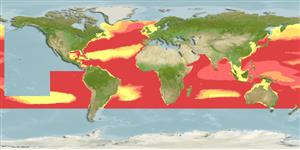Environment: milieu / climate zone / depth range / distribution range
Ecología
marino batipelágico; rango de profundidad 0 - 2000 m (Ref. 9927), usually 500 - 700 m (Ref. 6744). Deep-water; 65°N - 40°S
Circumglobal: In tropical to temperate waters. Eastern Atlantic: Iceland and British Isles to South Africa including Canary Islands and Ascension Island (Ref. 6744). Northwest Atlantic: Canada (Ref. 5951). Not recorded from the Mediterranean (Ref. 6744).
Tamaño / Peso / Age
Maturity: Lm ? range ? - ? cm
Max length : 27.6 cm TL macho / no sexado; (Ref. 5951); common length : 9.0 cm SL macho / no sexado; (Ref. 6536)
Espinas dorsales (total): 1; Radios blandos dorsales (total): 25-29; Espinas anales 1; Radios blandos anales: 18 - 24; Vértebra: 27 - 29. Body black dorsally, silvery on sides (Ref. 6622). Branchiostegal rays: 7-8 (Ref. 36622). Body deep, heavy, sides straight. Large adults very dark brown (Ref. 37108).
Juveniles are found from near surface to about 250 m to more than 1,000 m (Ref. 6536). Largest adults may be benthopelagic (Ref. 9851). Adults are plankton-eaters like the other members of the family (Ref. 6744). Oviparous, with planktonic larvae (Ref. 36622).
Life cycle and mating behavior
Madurez | Reproducción | Puesta | Huevos | Fecundidad | Larva
Paxton, J.R., D.F. Hoese, G.R. Allen and J.E. Hanley, 1989. Pisces. Petromyzontidae to Carangidae. Zoological Catalogue of Australia, Vol. 7. Australian Government Publishing Service, Canberra, 665 p. (Ref. 7300)
IUCN Red List Status (Ref. 130435)
Threat to humans
Harmless
Human uses
Pesquerías: de interés potencial
Más información
ReferenciasAcuiculturaPerfil de acuiculturaRazasGenéticaElectrophoresesheritabilidadEnfermedadesProcesamientoNutrientsMass conversion
ColaboradoresImágenesStamps, Coins Misc.SonidosCiguateraVelocidadTipo de nataciónSuperficie branquialOtolitosCerebrosVisión
Herramientas
Special reports
Download XML
Fuentes de Internet
Estimates based on models
Preferred temperature (Ref.
123201): 3.3 - 12.2, mean 8.1 °C (based on 510 cells).
Phylogenetic diversity index (Ref.
82804): PD
50 = 1.0625 [Uniqueness, from 0.5 = low to 2.0 = high].
Bayesian length-weight: a=0.02630 (0.01238 - 0.05589), b=3.03 (2.83 - 3.23), in cm total length, based on LWR estimates for this species & (Sub)family-body (Ref.
93245).
Nivel trófico (Ref.
69278): 3.4 ±0.45 se; based on food items.
Fishing Vulnerability (Ref.
59153): Low vulnerability (18 of 100).
Nutrients (Ref.
124155): Calcium = 14.5 [4.0, 67.8] mg/100g; Iron = 0.452 [0.132, 1.423] mg/100g; Protein = 2.82 [0.00, 6.75] %; Omega3 = 0.188 [0.059, 0.608] g/100g; Selenium = 14.6 [3.8, 60.7] μg/100g; VitaminA = 18 [2, 154] μg/100g; Zinc = 0.449 [0.188, 1.168] mg/100g (wet weight);
